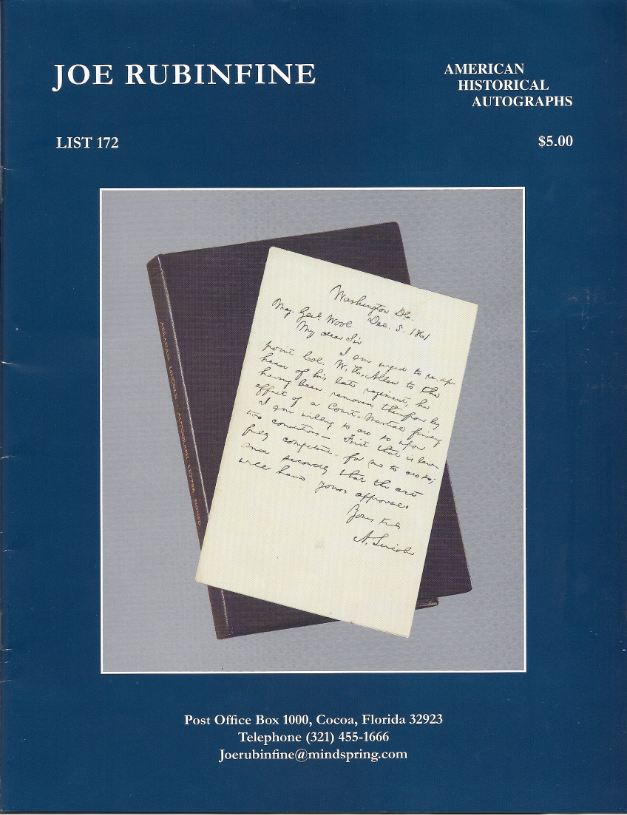Joe Rubinfine Offers Signed Documents from America's Greatest Leaders
- by Michael Stillman

Joe Rubinfine Offers Signed Documents from America's Greatest Leaders
Joe Rubinefine has released his List 172 of American Historical Documents. It features many of America's most important leaders, political and military in particular, from the 17th through the 20th century. They range from William Penn settling his colony during the 17th century, to Franklin Roosevelt pulling a nation out of its Great Depression. Along the way, the most notable of names, including Washington and Lincoln, make their appearances. Here are a few samples of signed documents from some of America's greatest leaders.
Item 17 is a letter between a pair of presidents during the American Revolution. It was written by Samuel Huntington, President of the Continental Congress at the time (June 1, 1781) to Caesar Rodney, then President of Delaware (who knew Delaware once had a President?). Huntington sent out letters to the various colonies notifying them of an offer by Austria and Russia to negotiate a peace between the Americans and the British. The Americans were interested, but not if it allowed Britain to retain part of the land within the colonies. Huntington notes the importance of the Americans seizing control of as much land occupied by the British as possible prior to any negotiations. Ultimately, Huntington reveals the bottom line - “Congress will...be prepared to accept of Peace upon no other Terms than the Independence of the Thirteen United States of America in all their parts...” The Americans victory at Yorktown a few months later would obviate the need for a compromise settlement. Priced at $15,000.
America's treatment of the Cherokee Indians was one of the darkest moments in the nation's history. In response to settlers wanting their land, President Andrew Jackson would side with the settlers, eventually leading to the Cherokees forced removal from their lands through the deathly “Trail of Tears” to Oklahoma. Several decades earlier, President Washington dealt with issues the Cherokee confronted, and if his attitude might seem a bit paternalistic today, he was far more concerned with the welfare of the Indians than was Jackson. Item 49 is Secretary of State Timothy Pickering's manuscript writing of Washington's Talk to the Cherokee Nation, which would be printed as a broadside to be distributed to Cherokee settlements. In it Washington notes the changing reality brought about by years of European settlement in the area. He points to the depletion of game, meaning the Cherokee are likely to confront growing hunger, while the absence of skins will afford them fewer goods to trade for essentials such as clothing to protect them from the cold. Washington's solution is to encourage the Cherokee to adopt the white man's ways. He asks them to try raising cattle, hogs, and sheep, which can both feed and clothe them, plus provide items they can sell to the whites. He also encourages the adoption of modern agricultural practices and the planting of corn and wheat. He says that his Indian agent will provide them with some plows and animals to raise. Washington also encourages the Cherokee to have their women learn the art of spinning and weaving. “I am inclined to hope that you are prepared to take this path...it may seem a little difficult to enter, but if you make the attempt, you will find every obstacle easy to be removed...” The President goes on to say that he will soon be returning to his farm (his term in office was to expire in less than a year) where he would be employing the same practices himself. Finally, Washington says that he has directed Secretary of War to prepare some medals which are to be given to Cherokees who follow his advice and work diligently. $12,500.